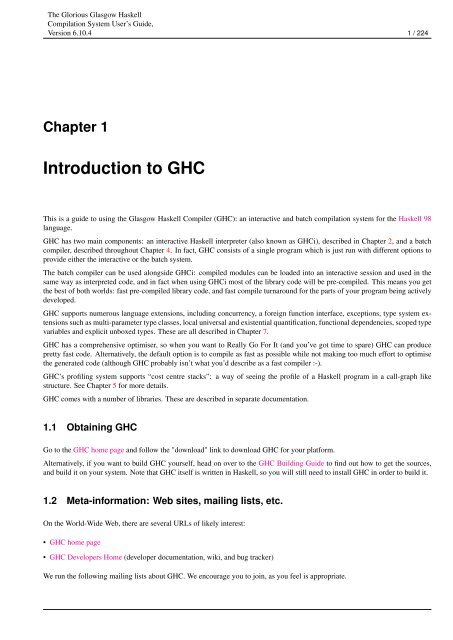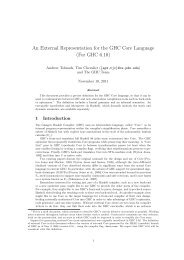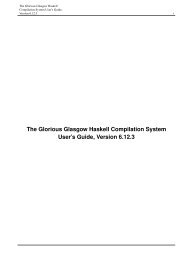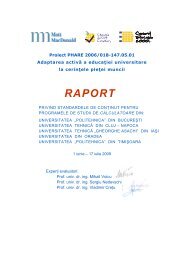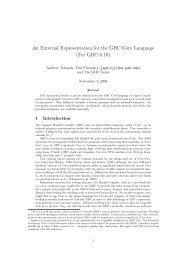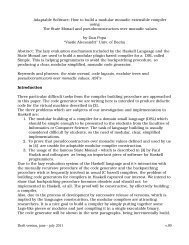The Glorious Glasgow Haskell Compilation System User's Guide ...
The Glorious Glasgow Haskell Compilation System User's Guide ...
The Glorious Glasgow Haskell Compilation System User's Guide ...
Create successful ePaper yourself
Turn your PDF publications into a flip-book with our unique Google optimized e-Paper software.
<strong>The</strong> <strong>Glorious</strong> <strong>Glasgow</strong> <strong>Haskell</strong><br />
<strong>Compilation</strong> <strong>System</strong> User’s <strong>Guide</strong>,<br />
Version 6.10.4 1 / 224<br />
Chapter 1<br />
Introduction to GHC<br />
This is a guide to using the <strong>Glasgow</strong> <strong>Haskell</strong> Compiler (GHC): an interactive and batch compilation system for the <strong>Haskell</strong> 98<br />
language.<br />
GHC has two main components: an interactive <strong>Haskell</strong> interpreter (also known as GHCi), described in Chapter 2, and a batch<br />
compiler, described throughout Chapter 4. In fact, GHC consists of a single program which is just run with different options to<br />
provide either the interactive or the batch system.<br />
<strong>The</strong> batch compiler can be used alongside GHCi: compiled modules can be loaded into an interactive session and used in the<br />
same way as interpreted code, and in fact when using GHCi most of the library code will be pre-compiled. This means you get<br />
the best of both worlds: fast pre-compiled library code, and fast compile turnaround for the parts of your program being actively<br />
developed.<br />
GHC supports numerous language extensions, including concurrency, a foreign function interface, exceptions, type system extensions<br />
such as multi-parameter type classes, local universal and existential quantification, functional dependencies, scoped type<br />
variables and explicit unboxed types. <strong>The</strong>se are all described in Chapter 7.<br />
GHC has a comprehensive optimiser, so when you want to Really Go For It (and you’ve got time to spare) GHC can produce<br />
pretty fast code. Alternatively, the default option is to compile as fast as possible while not making too much effort to optimise<br />
the generated code (although GHC probably isn’t what you’d describe as a fast compiler :-).<br />
GHC’s profiling system supports “cost centre stacks”: a way of seeing the profile of a <strong>Haskell</strong> program in a call-graph like<br />
structure. See Chapter 5 for more details.<br />
GHC comes with a number of libraries. <strong>The</strong>se are described in separate documentation.<br />
1.1 Obtaining GHC<br />
Go to the GHC home page and follow the "download" link to download GHC for your platform.<br />
Alternatively, if you want to build GHC yourself, head on over to the GHC Building <strong>Guide</strong> to find out how to get the sources,<br />
and build it on your system. Note that GHC itself is written in <strong>Haskell</strong>, so you will still need to install GHC in order to build it.<br />
1.2 Meta-information: Web sites, mailing lists, etc.<br />
On the World-Wide Web, there are several URLs of likely interest:<br />
• GHC home page<br />
• GHC Developers Home (developer documentation, wiki, and bug tracker)<br />
We run the following mailing lists about GHC. We encourage you to join, as you feel is appropriate.


